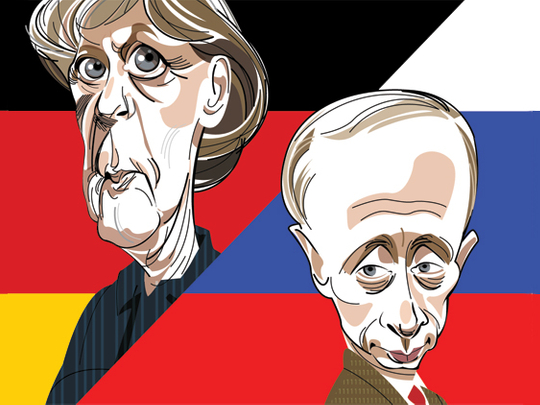
When Angela Merkel told US President Barack Obama last month that Russian President Vladimir Putin was living “in another world”, it was a signal of how far the German Chancellor’s perception of Russia’s leader had come.
After the Russo-Georgian war of August 2008, Merkel was prepared only to say that “some of Russia’s actions [were] disproportionate”. This time though, she went much further, telling the German parliament that Moscow’s actions in Ukraine are a threat to its neighbours and that the repercussions have the potential to “hugely damage Russia ... both economically and politically”.
Berlin’s policy towards Russia reflects a tug of war between two schools of thinking — one that insists that Germany should uphold the values of democracy and freedom in its dealings with foreign powers; and another that is impatient with such concerns when they conflict with Germany’s economic interests.
Each side scorns the other. The “realists” stand accused of shameless opportunism while the self-styled idealists are dismissed by their opponents as gutmenschen — meaning naive moralisers — or simply Russophobes.
In the end, it is usually the realists who prevail. Two months after the war in Georgia, Merkel attended the signing of a multibillion-euro deal between Russian energy giant Gazprom and Eon, the German utility company. In July 2009, the murder of Natalya Estemirova, the human rights activist, cast a shadow over a German-Russian summit that I was attending. Nonetheless, I remember it as a glamorous bilateral event that served as the backdrop for huge deals, such as the one between Siemens and Russian Railways. After Putin returned to the Kremlin in 2012, Merkel signalled her unhappiness with his tendency to meet dissent with brutal suppression. Yet, she portrayed Russia and Germany as friendly partners all the same.
Russia’s annexation of Crimea has killed what German politicians often refer to as the “spirit of friendship and partnership” between the two countries. Merkel now aims for a pro-European policy on Russia that is principled yet realistic. However, progress will depend on dealing with a series of obstructive partners at home.
First there is Merkel’s left-wing coalition partner. The Social Democratic party has a long history of giving Moscow the benefit of the doubt and allowing wishful thinking to creep into its assessment of Russia’s motives. Look back to 2007. Then, as now, Merkel was chancellor, the SPD’s Frank-Walter Steinmeier was foreign minister and Putin was arresting his opponents and accusing the West of plotting against him. In Germany, we were discussing whether the “new Ostpolitik” of rapprochement through interdependence was sustainable. A year later, Russia invaded Georgia.
The second hurdle is the German business community. So far, the asset freezes and visa bans have targeted only a few select individuals close to the Kremlin. However, Merkel has hinted at so-called phase three sanctions, which would cause widespread damage to business relations. Top executives are trying hard to prevent them. Polls suggest that about two-thirds of Germans are against them, too.
Finally, Merkel has had to contend with public pronouncements from all three living former chancellors. Gerhard Schroeder rushed to Putin’s defence and all but blamed the European Union for the crisis, as behoves a man on the Gazprom payroll. Then the omnipresent Helmut Schmidt put in his two cents, talking about his understanding for Putin. Completing this bizarre procession of Germany’s elder statesmen, Helmut Kohl expressed his worries about western leaders’ lack of sensitivity in dealing with Russia, too.
Unlike her predecessors, Merkel is not getting into this blame game. One should be wary of overplaying the fact that she grew up in east Germany. But first-hand experience of Soviet society has inured her to propaganda. She can see beyond the geopolitical chessboard to the plight of the subjugated and the Orwellian tribulations they must endure. That is why Merkel seems to have lost patience with Putin’s talk of spontaneously organised self-defence units and hyped-up enemies.
None of this is likely to change Putin’s behaviour. Given the magnitude of the challenges that Merkel faces at home, she has only a limited ability to make an impact on the international stage.
Nonetheless, in leading Germany off the path of calculated bigotry, the chancellor has achieved something important. Perhaps if Europe’s largest country had not for so many years pursued a wishy-washy foreign policy, Russian revanchism would not have come so far as to provoke the present crisis. And if other countries follow Merkel’s lead, the Kremlin may have to rethink a strategy that relies on repeatedly exploiting the west’s paralysis.
— Financial Times
Karl-Theodor zu Guttenberg, a former German defence minister, is chairman of Spitzberg Partners.










